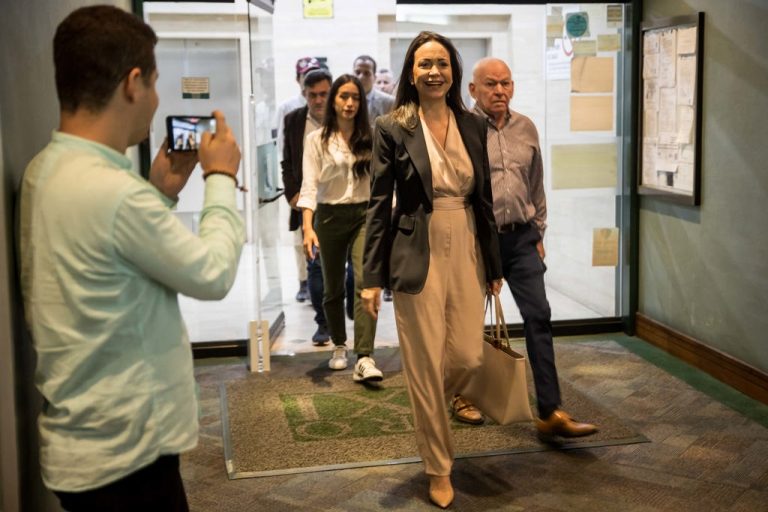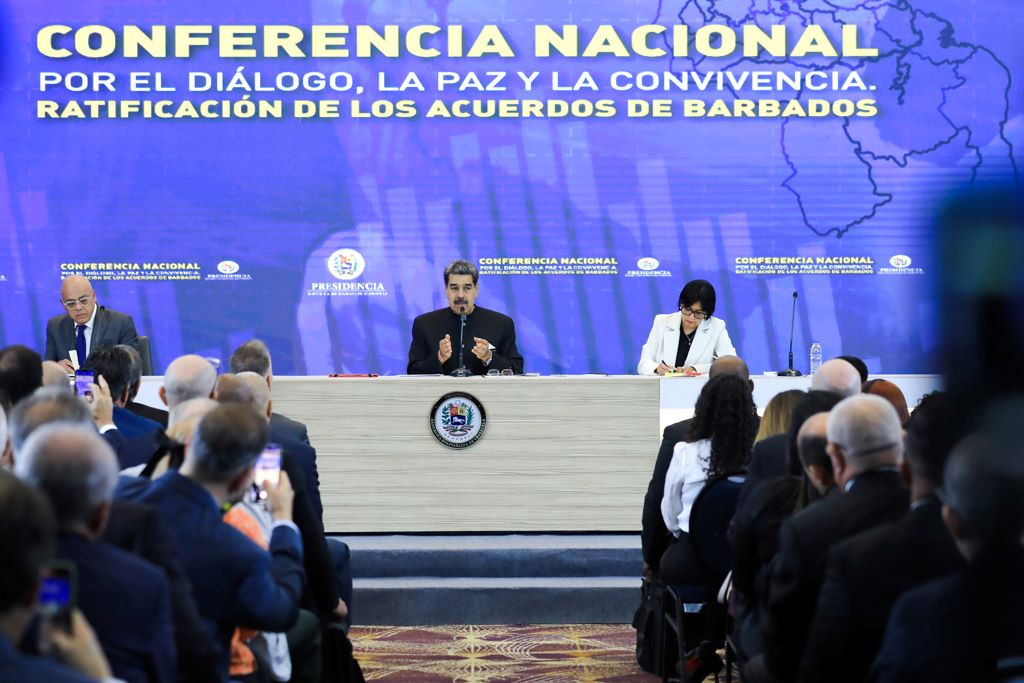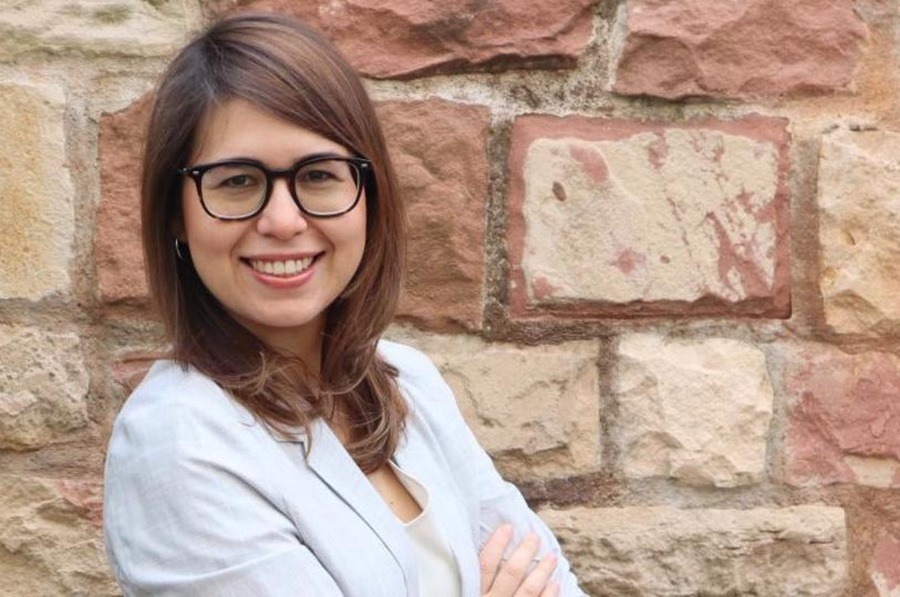1 de noviembre 2023

Children of Exile: The Births “Sowing Hope” in the Camp of Nicaraguan Farmers

PUBLICIDAD 1M
PUBLICIDAD 4D
PUBLICIDAD 5D
Political expert Maryhen Jimenez analyzes Venezuelan President Nicolas Maduro’s agreement with the opposition, Maria Corina Machado’s primary victory

Former Venezuelan deputy Maria Corina Machado arrives at a press conference in Caracas on October 24, 2023. Photo: Miguel Gutierrez / EFE
The Barbados agreement between Nicolas Maduro’s regime and the unified platform of the Venezuelan opposition entailed a commitment on both sides “to take part in elections in the second semester of 2024.” This has generated certain hopes in Venezuela and the international community. Meanwhile, the recent opposition primary elections, in which former deputy Maria Corina Machado won overwhelming, represent a majority mandate “for democratic change, and to participate in the elections and win.” That’s the opinion of Venezuelan political analyst Maryhen Jimenez.
Nonetheless, the “road map to the elections” in Venezuela is riddled with uncertainty and mined with political obstacles. Maria Corina Machado has been arbitrarily inhibited from running by the Maduro government. Within the [governing] Chavista camp, there are sectors that place their bets on eliminating the opposition candidates before the elections, as Nicaragua did in 2021. On the other hand, however, the United States is proffering the carrot of suspending the economic sanctions as an incentive for Maduro to commit to the electoral process.
“It’s a fragile agreement, but it’s a window we must make into a door,” states Jimenez, who holds a PhD in Political Science from Oxford University. She advocates for the opposition to maintain a strategic vision: “The mandate of the primaries is democratic change – to participate in the elections and win.”
Jimenez is an expert in comparative authoritarianism, democratization, opposition movements and political parties. She’s been a guest researcher at the Wilson Center, Princeton University, and the CIDE (Center for Economic Investigation and Teaching) in Mexico. She’s also worked at the Inter-American Court of Human Rights in Costa Rica, and the Americas Division of Human Rights Watch.
In this interview with Carlos F. Chamorro of the online television news program Esta Semana and Confidencial, the researcher analyzes the scope of the agreements between Maduro and the opposition, the challenges Maria Corina Machado faces following her victory in the primary elections, and the “incentives” the United States is offering the Maduro regime to commit to an electoral process.
The Barbados agreement between the Maduro government and the unified platform of the Venezuelan opposition has been interpreted as an endorsement on both sides of the electoral road in Venezuela. Is there any road map towards the 2024 elections there?
On paper, that’s what the agreement lays out. It’s an important agreement in the context of an authoritarian country where the institutions have been completely dismantled. The accord offers a light, a tiny spark of hope, or a window towards an electoral route that can be accepted and traveled by the principal figures.
That accord is very fragile, because right now there’s still sharp conflict over it among the political elites, hence it must be regarded with great caution. Although it’s been signed, false steps could have a negative effect on the process. But yes, up until now, the talk is of elections in the second half of next year.

The opposition held their primary elections with the participation of over two million Venezuelans. However, the government has now disqualified this primary as fraudulent, and even claimed that a crime has been committed. What does all of this signify?
There are many very important lessons here, not only for Venezuelan society, but also for different opposition movements, and also societies that are seeking democracy.
In the first place, the role of the ballot as an instrument of change has been ratified. That’s the preferred mechanism for Venezuelan society, as it’s been for the past 20 years. A broad percentage of the population has always wanted to participate in seeking change through elections. Venezuelan society prefers peaceful Constitutional or electoral mechanisms for the resolution of the conflict, and rejects extremist or extra-institutional paths, such as sanctions that could produce a collapse, or diplomatic isolation, or seeking change through protests or another type of mechanism. That, to me, is the first lesson.
The second is the willingness of Venezuelan society to participate and mobilize even within an authoritarian context that implies censorship, risk, fear. Even so, people came out – over 2.3 million people from all generations – not only in the urban centers, but also in the working-class communities, despite the intimidation that took place before the process.
In third place, there’s the pivot that some of the elite members of the opposition have shown recently. In authoritarian contexts, the kinds of opposition are very diverse, as in some sense they have to be. In contrast with an authoritarian bloc, where most of the time there’s no internal democracy, the opposition movements are diverse: they have different opinions, different ideologies, and different preferred mechanisms in the search for change.
Now, for the first time, there’s a consensus among the opposing elites to participate in the elections. There have always been leaders who maintained that you couldn’t vote in a dictatorship, that [elections] should be boycotted, and that only through pressure could change come. Here, what we’re seeing is more coordination or consensus around the decision to participate and mobilize society next year.
Maria Corina Machado’s turnaround
Maria Corina Machado has indisputably won these primary elections, with more than 90% of the votes. However, the government now insists that Machado has been suspended from running. Is Maria Corina Machado the opposition candidate, or will she be just an important player for the opposition?
That’s a great question. Unfortunately, I can’t respond with any certainty because this process is characterized precisely by these uncertainties. Despite having been elected by a broad percentage of the 2.3 million Venezuelans who voted, we don’t know if she will be able to be the unity candidate. There’s an arbitrary legal measure hanging over her. Authoritarian regimes always seek to divide their opposition and use different means to do so – repression, cooptation, exile, which is also a repressive measure. And now this is also hanging over her head.
The big question is what can the Venezuelan opposition do, and what can the democratic society that chose her as their unified candidate do, to exert pressure in order to have them accept her candidacy.
Here’s where the dilemma imposed by this juncture arises. Will she have the strategic foresight to understand the historic moment the country is going through, and if it’s not possible for her to register, seek a mechanism that could channel the desire for change in Venezuela? Over 80% of Venezuelans want political change. Hence, it’s essential to understand the high probability of winning that, in theory, the Venezuelan opposition has, and also what that implies.
In this context, what role does negotiation and international pressure play? The United States has announced an important softening of the oil sanctions, in exchange for the Maduro regime’s committing itself to elections and not impeding the participation of the opposing candidates. They’ve even said that if the suspensions aren’t lifted, the sanctions could be reimposed. Can these conditions function, if the Maduro regime itself has said they won’t accept any kind of pressure?
That too remains to be seen. Right now, there’s been a softening of the sanctions on gas and oil. This is important because the government is facing its worst moment in terms of popular support. So, they need access to resources to try and win over more support.
How far they go with the electoral guarantees, or even in accepting the adversary that Venezuelan society has chosen, will also depend a little on the level of fear within the authoritarian coalition of a possible departure from power.
There’ve been several declarations on the part of spokespersons from the United States government indicating that Venezuela is now promoting a democratic process. While there’s been a very clear decision to select Maria Corina, there’s also a very clear desire for change. The government is betting that the opposition will fragment and not be able to present a strong candidate.
It seems valuable to me to have the international actors insist on a route, a process, and not only on a person. Obviously, she’s not just a person, she’s the person who’s been chosen by Venezuelan society, but I believe there’s also some room for strategic intelligence on the part of the opposition leaders, in order to defeat the dilemmas and obstacles that the current power structures are going to continue imposing.
If Maduro fails to obtain the economic resources, if the international negotiations stall and it becomes clear they’ll never be able to win a democratic election in Venezuela against Maria Corina or any other opposition candidate, could Venezuela then opt to replicate the 2021 Nicaraguan playbook? At that time, the Ortega regime, in a de facto way, completely annulled the electoral competition and excluded all the opposition candidates, imprisoning them and/or totally inhibiting them from running.
Authoritarian coalitions are usually made up of more radical groups that are determined to remain in power at any cost. There are also other, more moderate, groups, although from outside it’s sometimes hard to perceive them, who fear reactions to protests, if they go down the road of very severe repression. This could happen, as it did in the case of Nicaragua.
No doubt there are groups that would be willing to go down that road, and it’s on the table. I hope it doesn’t come to that, because we’re well aware of the price Nicaraguan society has paid for the authoritarian decision to absolutely close off all civic spaces – it’s a very steep price.
But I insist that there’s a window here, and we must try to keep that window open, and hopefully turn it into a door. What would be important for this? Conversing at the proper time about the guarantees – not only the electoral ones, but the guarantees groups need that the authoritarian coalition would indeed cede power. That hasn’t yet been discussed, but I think these are important elements to consider.

The emergence of Maria Corina Machado with such an overwhelming level of support, marked a change in the panorama of the Venezuelan opposition, in terms of the political parties’ leadership. Could she become a decisive force, at this moment, for leading or coordinating an opposition coalition?
That’s an extremely interesting question. There are analysts and sympathizers with her bloc who consider that this represents a before and after in Venezuelan politics, like a crack or rupture. I want to be a little more cautious about such assertions because they’re very volatile in these situations. A leadership may emerge at one moment, and then collapse in the next. That’s also happened in the recent past of Venezuelan politics. I do believe that her election is a lesson for the traditional opposition groups: not having a strong competitor revealed the weakness of the other parties, but it’s also clear that the other candidates they backed weren’t as well-known as she is.
Maria Corina is part of the opposition establishment, but she knew how to sell her narrative, her strategy, her pivot, especially as an outsider. So, in the absence of others, and with the successful campaign she waged, it certainly marks a milestone in the opposition world.
There’s still a very long road left to travel. She now holds great responsibility in the opposition camp’s search for democratization. Another great responsibility lies in coordinating the diverse actors and not necessarily betting on defeating the traditional opposition parties, but rather on strengthening them.
Democracies require solid political parties, parties with programs, pluralistic parties, and I believe she’s now going to travel down a very interesting road, full of obstacles, but in which she also has the option to mark out new guidelines, coordinate an opposition that grows stronger, and not weaken her companions in the struggle.
Does the Venezuelan opposition have a political project for democratic transition, or does Maria Corina have her own project? Is there consensus, or debate, around the road to democratic transition?
This is another very important topic, because the Venezuelan opposition is very diverse and up until recently she [Maria Corina Machado] had been one of the most extreme voices. And she also has a very clear project, which she describes as center-liberal.
The mandate given her by the people who participated in the primary isn’t to implement a political project of her particular party, but to elect her as a unity candidate, with the explicit mandate of participating in elections and being able to win those elections.
Prior to the primaries, the candidates who were going to participate signed a minimal agreement. It was a programmatic agreement, but it included a commitment to values, democratic practices, and also to resolve the issue of inequality and poverty – not only that generated during recent years under this government, but also the structural roots of poverty. Venezuela today is a poor country, highly unequal, with over 7.7 million Venezuelans outside its borders, who also are experiencing much misery.
As such, a lot of consensus, a lot of debate, is needed in the heart of the opposition to establish a platform of government reforms and the reforms they can make in public policies, in a sustainable manner; to attend to the necessities of the Venezuelan population, not only within Venezuela, but also in other countries.
This debate is still waiting to happen. Precisely now, she has the great opportunity and responsibility to call on all the [opposition] sectors to work, to establish joint working commissions by area, in order to construct a democratizing route, that could offer some answers to the necessities of Venezuelan society today, not the necessities of just some groups. All with an understanding of how difficult and costly this government that calls itself socialist has been for Venezuelan society.
Now that the primaries are over who’s holding the ball? Is it in the government’s court? In Maria Corina’s court? In the United States court? The US has said it expects changes in the upcoming weeks, referring specifically to this issue of the candidate suspensions, for example.
The ball is in all these courts at once. The government has committed itself to complying. Some political prisoners have already been freed, and more releases are expected. That’s fundamental. And we also have the matter of complying with the agreement signed in Barbados.
The most important concession was the softening of the sanctions. So now, the government must also respond with what it agreed on. Things are a little more complex in the opposition camp, due to the many diverse actors, but as Maria Corina Machado noted clearly when she announced her candidacy: now a consistent and arduous job lies before the opposition camp, to respond to and even go beyond what the agreement says.
I believe that a year is sufficient time to transform the opposition camp into a viable and attractive option, not only for the people who participated in the primary. The opposition camp is much broader than those who voted in the primary. Some 35 – 40% of the people in Venezuela say they’re not aligned with any of the two camps. There are also some 15% of the Chavistas who are unhappy with the government’s management.
In other words, there are multiple arenas for action, and ample room for a proposal of government reform that can be carried out by the opposition group.But all this is still under construction and remains to be seen.
This article was originally published in Spanish in Confidencial and translated by Havana Times.
PUBLICIDAD 3M
Periodista nicaragüense, exiliado en Costa Rica. Fundador y director de Confidencial y Esta Semana. Miembro del Consejo Rector de la Fundación Gabo. Ha sido Knight Fellow en la Universidad de Stanford (1997-1998) y profesor visitante en la Maestría de Periodismo de la Universidad de Berkeley, California (1998-1999). En mayo 2009, obtuvo el Premio a la Libertad de Expresión en Iberoamérica, de Casa América Cataluña (España). En octubre de 2010 recibió el Premio Maria Moors Cabot de la Escuela de Periodismo de la Universidad de Columbia en Nueva York. En 2021 obtuvo el Premio Ortega y Gasset por su trayectoria periodística.
PUBLICIDAD 3D